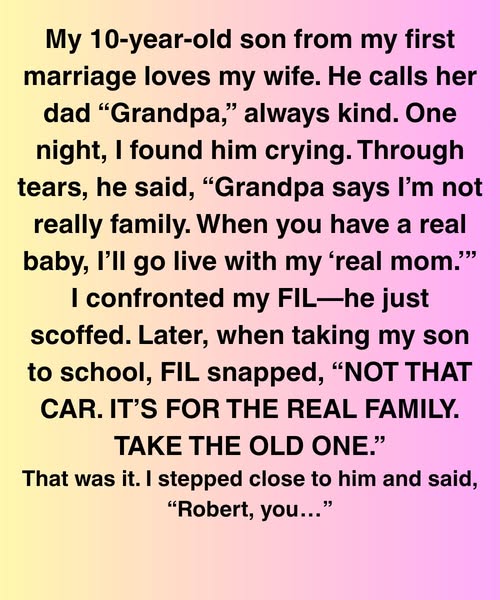When my son was born, everything snapped into place like a lens finally brought into focus. He’s ten now, from my first marriage, the compass I’ve used to steer through every storm. When I remarried, I braced for turbulence—new routines, new faces, all the unknowns that keep a kid’s stomach in knots. Instead, he exhaled. “Mom” slipped out over a plate of spaghetti one evening and stayed. Her dad became “Grandpa” after the two of them spent a Saturday tightening a stubborn bike wheel in our driveway. For a while, I didn’t dare say it out loud: we were lucky.
Then I found him one night, lights off, knees tucked to his chest, trying to keep his crying quiet. I sat on the floor beside him and waited the way you do when you know you can scare a confession away by reaching too fast. He finally whispered, “Grandpa says I’m not really family. He said when you and Mom have a real baby, I’ll have to go live with my real mom.”
My hands went cold. The questions hit all at once—how long he’d been carrying that, what else had been said, why anyone would hand a child that kind of fear. I pulled him close and told him the truth as plainly as I could: he is mine, he belongs, and there is no version of our life that exists without him in it.
The next day, I went to my father-in-law. I kept it simple: he’s a child, he heard you, you hurt him. He shrugged as if I’d commented on the weather. No apology, just a scoff about “blood” and “real family.” I left before my temper said something that would live longer than I wanted it to.
At home I tried to make love louder than the damage—extra hugs at the door, a note tucked into his lunchbox, a bedtime routine strong enough to anchor ships. Still, the air thinned whenever we were all in the same room. The quiet around my father-in-law felt less like peace and more like a fuse.
A week later, the fuse burned down. We were headed out for school, my son telling me about a science project while we grabbed our shoes, when my father-in-law pointed through the window at the driveway. “Not that car,” he barked. “It’s for the real family. Take the old one.”
The room went still. I stepped close enough to smell coffee on his breath and kept my voice level. “Robert, you don’t get to decide who my family is. My son is my blood. He is loved, he is wanted, and he belongs here. If you can’t accept that, you’re the one who doesn’t belong.” He started to speak; I shook my head once. Then I took my kid’s hand and walked him to the car he likes—the one with the sticky cup holder and the dinosaur sticker on the dash. On the drive, I told him again, in a dozen different ways, that love doesn’t get voted on.
After that, the boundaries were not a suggestion. My father-in-law could visit if he behaved like a decent human being, which included treating my son as exactly what he is: our child. No comments, no tests, no separate set of rules. If he couldn’t manage that, he didn’t come over. My wife backed me without wobbling. She had a hard conversation with her dad and made it clear the door he kept trying to close wasn’t the one he thought.
Nothing healed overnight. Trust knits itself back together like bone—slowly, with aches in bad weather. But the proofs started to stack up in the quiet. Homework spread across the kitchen table. Two sets of muddy shoes by the door after a backyard game. His name all over the family calendar. He slept deeper again.
People like to say blood defines family. That’s the lazy version. Family is the person who shows up, who remembers how you take your pancakes and which math problems make you stall. It’s the hand that finds yours in a parking lot without looking. My son chose “Mom” without prompting. He chose “Grandpa,” too, before someone tried to pull the rug out from under him. I chose him first and I’ll choose him last. The rest is noise.
So this is where we landed: in our house, love is what draws the family tree. If you can read it, you’re welcome at the table. If you can’t—or won’t—there’s the door.

